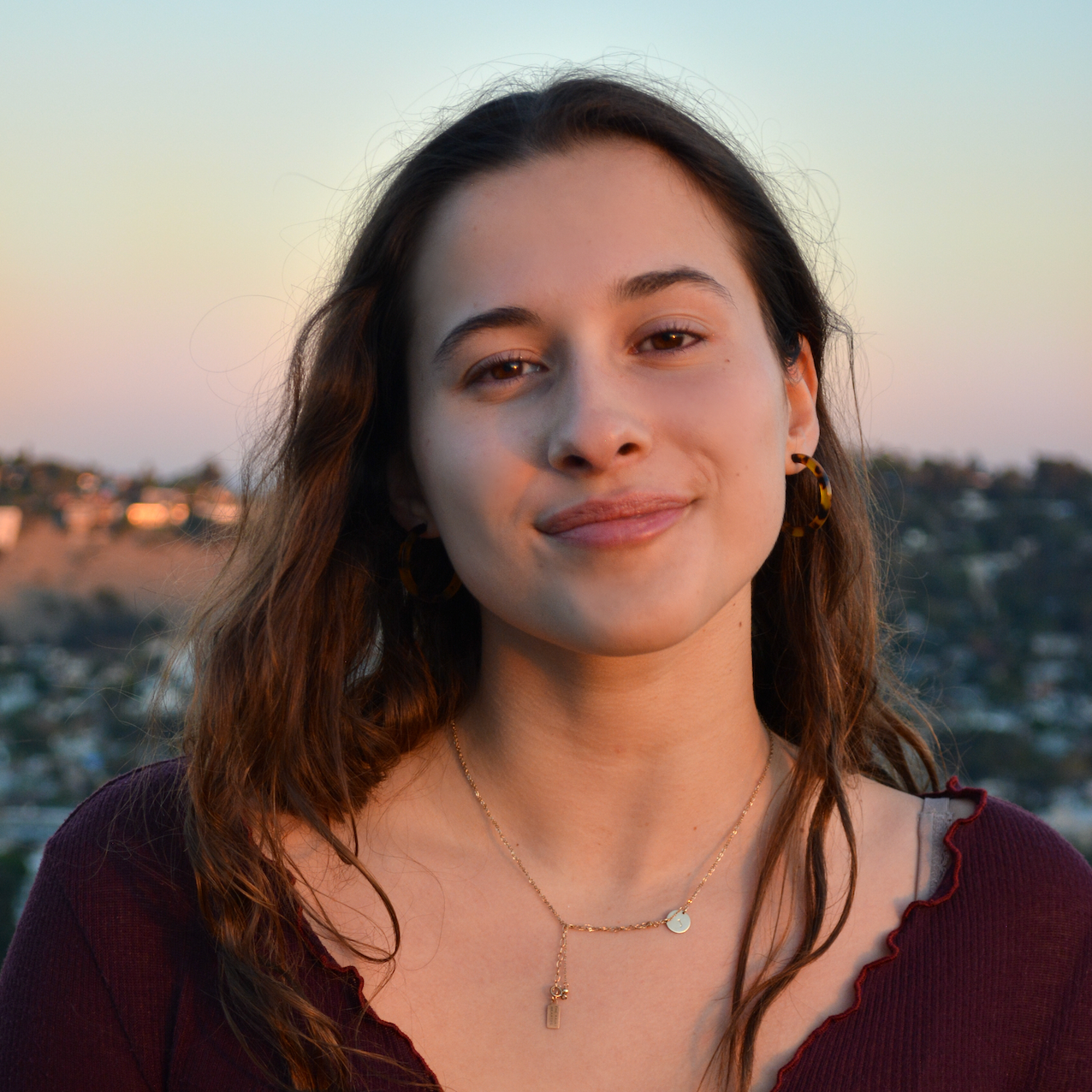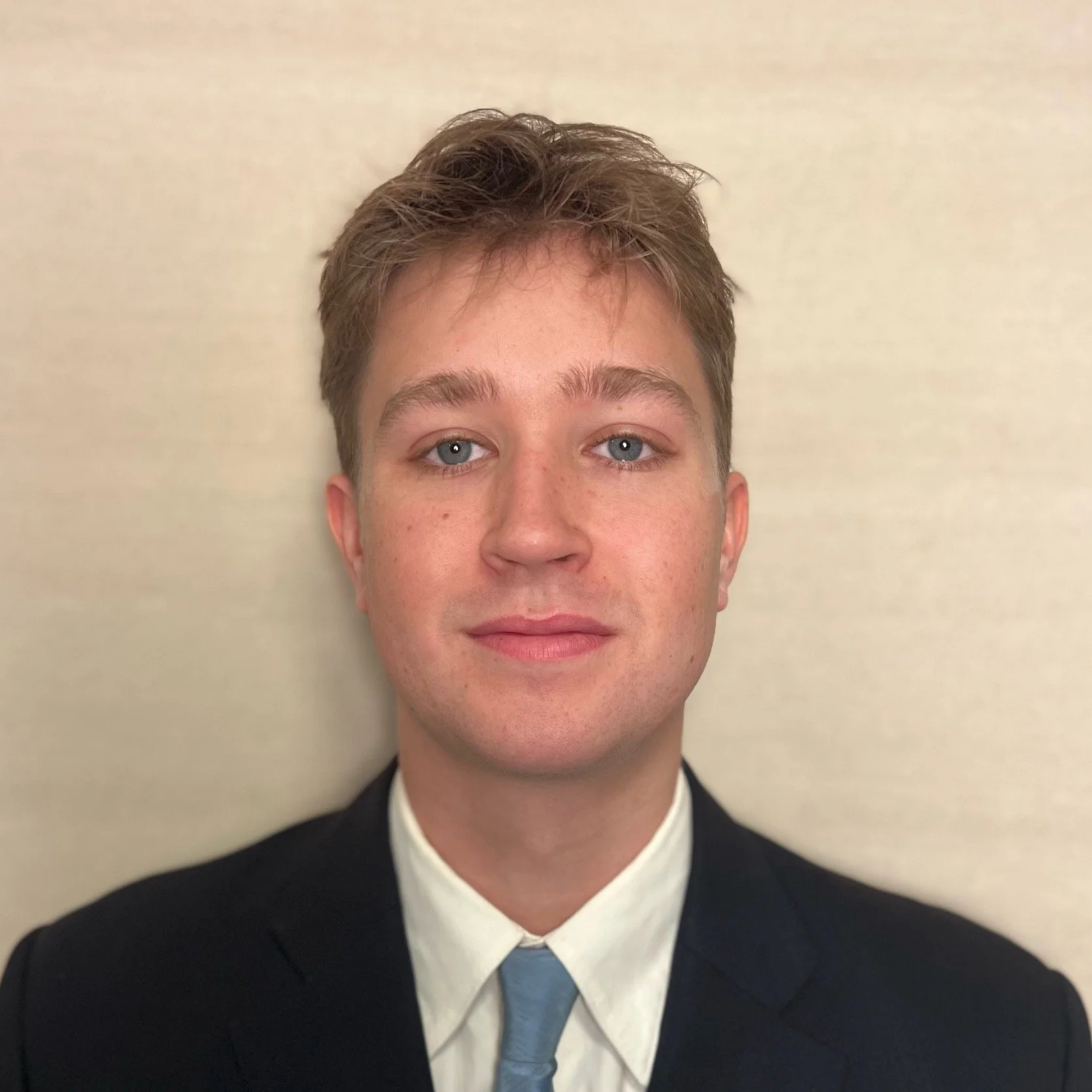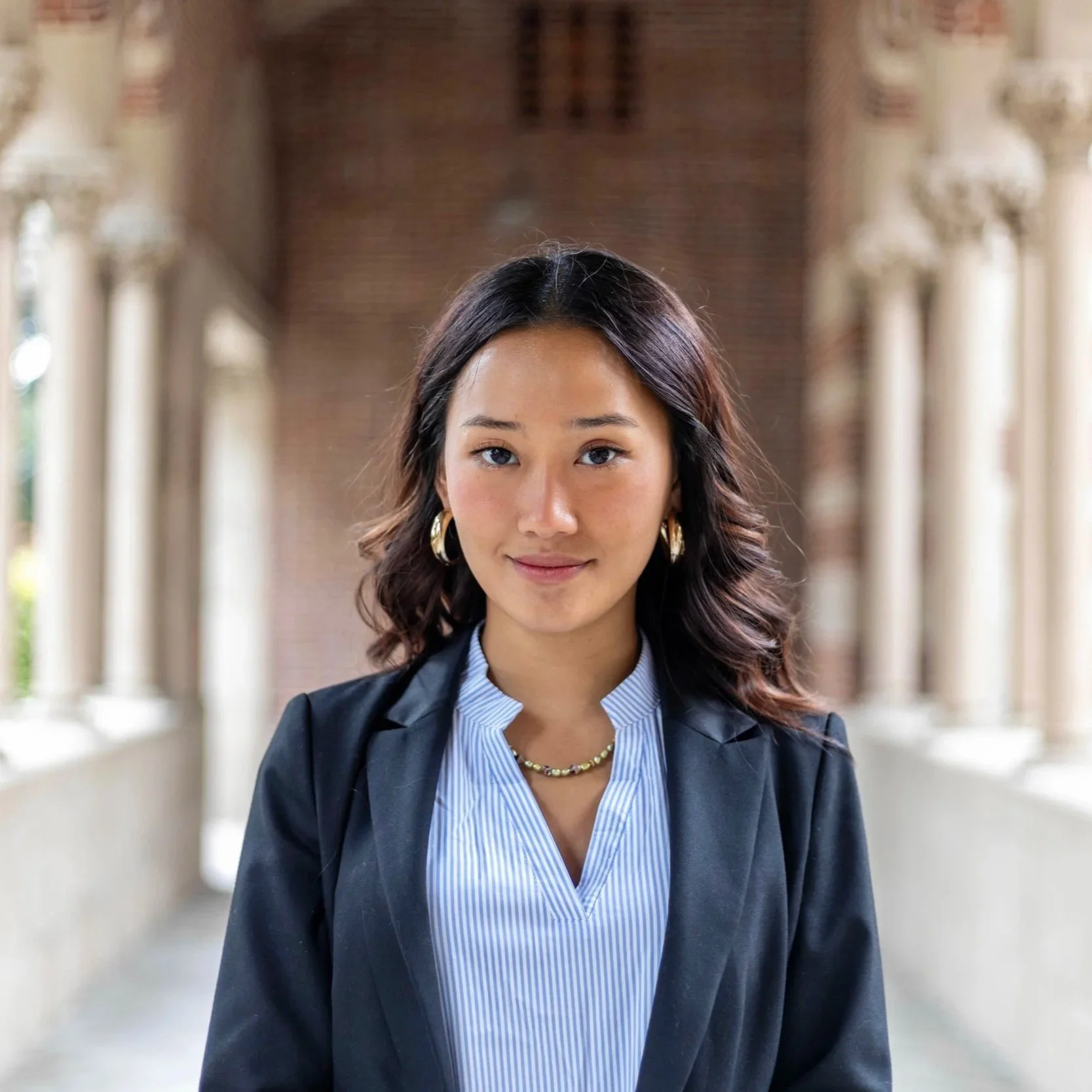Meet the Pacific Council Junior Fellows
The Pacific Council Junior Fellow Program is a longstanding program designed for university students and recent grads with a demonstrated interest in global affairs and public policy. It offers an opportunity for emerging leaders to gain experience in international relations through a member-based non-profit.
This summer, the Pacific Council welcomed its 2025 summer cohort of Junior Fellows. Please read below to learn more about the team:
Juliette Hawley
Pacific Council Department: Membership
Hometown: Los Angeles, CA
College/University and Major: Tufts University, International Relations
Languages Spoken: English, French, and Spanish
Areas of Interest: Immigration and Migration; Education
Fun Fact: I used to be a competitive gymnast and was once the California state champion on the balance beam!
What are you studying (pursuing in your career), and why?
I’m studying International Relations and planning to pursue a career in public service. I’m not entirely sure what form that will ultimately take, but I know I want to use my education to support those who haven’t had the same opportunities I’ve had. It’s also a way to connect with people whose stories challenge my perspective and open a window into worlds I might never have encountered otherwise.
What global issue are you most interested in addressing, and how do you envision making an impact?
I have always been interested in migration and refugee crises. It’s an issue that hits very close to home as well as most corners of the world. It’s also at the crux of so many other international issues. I hope to make an impact by working at the intersection of policy and advocacy; whether it’s through shaping more humane asylum systems, supporting local
resettlement programs, or holding international institutions accountable for their role in displacement, I want to help build solutions that are both systemic and grounded in the real experiences of migrants themselves.
How do you stay informed about current events in global affairs? Any favorite sources or platforms?
I like listening to podcasts to stay informed about current events in international affairs, especially while sitting in LA traffic. A couple of my favorites are Pod Save the World and The President’s Inbox by the Council on Foreign Relations. Pacific Council events have also been a great resource I’ve been taking advantage of to hear directly from experts in the field!
If you could have dinner with any global leader, past or present, who would it be and why?
If I could have dinner with any global leader, it would be Angela Merkel. When I wrote a research paper on the Syrian refugee crisis in high school, I learned how, as Chancellor of Germany, she faced significant backlash and political risk by welcoming over 1.2 million refugees at the crisis’s peak. Her decision was controversial and has been criticized for fueling the rise of far-right populism and prioritizing moral responsibility over national interest. I’d be curious to ask how she responds to those criticisms and how she weighed the risks at the time, balancing Germany’s long-term stability with an immediate humanitarian need. I’d also want to hear what lessons she believes global leaders, especially in the United States, should draw from that moment as they confront their own migration and border challenges.
What will you be working on during your fellowship?
During my fellowship, I’ve been working with Jasmine and Trinity from the Membership team on a research project focused on how international affairs membership organizations define and deliver value to their members. I’ve been looking at how peer organizations structure their memberships, foster engagement, and position themselves within the broader international affairs space. In interviewing both members of the Council and other organizations, the goal is to help the PCIP strengthen its own role and impact within that landscape.
Joseph Leonard
Pacific Council Department: Communications
Hometown: Brooklyn, NY
College/University and Major: University of Kent, BA in Politics and International Relations
Languages Spoken: English, learning Mandarin
Areas of Interest: Cross-strait relations, hybrid and grey-zone warfare, geopolitics
Fun Fact: I love ice hockey and surfing year-round at the Rockaways in New York
What are you studying (pursuing in your career), and why?
I want to research the rise in hybrid national security threats, especially cognitive and information warfare operations. As powerful authoritarian adversaries target smaller democracies, they are increasingly utilizing strategies that fall short of traditional “red-lines”, while degrading their opponents' capabilities. I believe the targeting of societal stability and attempts to influence democratic outcomes are just as urgent as conventional threats. Adversaries using existing divisions to manipulate opinions and distract attention away from their revisionist ambitions at critical moments require a more dynamic strategy to respond.
What global issue are you most interested in addressing, and how do you envision making an impact?
I think prioritizing educating young Americans about foreign affairs would address a lack of knowledge among voting adults. Considering the outsized global impact of U.S. elections, Americans should be better equipped to understand the repercussions of their decisions. I worry that the combination of attacks on U.S. education and the dismantling of institutions and norms of global engagement and cooperation could cause future generations of voters to be even less concerned with global leadership.
I want to learn how best to translate complicated foreign policy issues into easily digestible insights and highlight the consequences for people's lives. To this end, I am experimenting with a social media project that does just that, and I'd like to continue working to bridge this gap in the future.
How do you stay informed about current events in global affairs? Any favorite sources or platforms?
I trust Foreign Policy and The Diplomat to give me the low-down on international affairs, The New York Times, The Atlantic, and The Washington Post for U.S. news, and the Financial Times, The Daily Telegraph, and The Guardian for U.K. and European news.
For China-focused reporting and analysis, I like the Asia Society's Center for China Analysis, CSIS' ChinaPower Project, and the China Leadership Monitor. I've found the GMF’s Alliance for Securing Democracy has fantastic monitoring of foreign malign influence operations, especially its Hamilton 2.0 dashboard. And for U.S. defence discussions, I think War on the Rocks has some great takes.
If you could have dinner with any global leader, past or present, who would it be and why?
A discussion with former President Biden would be fascinating and timely. His attempts to reassure the world that American internationalism was back after the “blip” of the first Trump presidency came at a pivotal moment and appeared short-lived in the end. I think it could be very enlightening to hear his honest thoughts on U.S. global leadership and whether a post-Trump reset is possible.
What will you be working on during your fellowship?
I’m currently working on a series of articles about the domestic implications of the U.S.–China's great-power competition to be published in the Pacific Council Magazine. As I previously mentioned, I’m also using social media to learn how to better educate younger audiences about foreign policy issues, posting short videos on topics from the article series.
Luisa Luo
Pacific Council Department: Operations
Hometown: Beijing, China + Los Angeles, CA
College/University and Major: University of Southern California, BA with Double Majors in NGOs & Social Change and Narrative Studies
Languages Spoken: Mandarin, English
Areas of Interest: democratic governance, human rights law, Asian regional studies, policies on migration and exile
Fun Fact: I am training to complete the World Major Marathons
What are you studying (pursuing in your career), and why?
As a student in the Social Sciences and Humanities, I aim to utilize storytelling and civic media as tools to address social conflicts and promote policy reforms. Much of my learning and practical experience takes place at the intersection between diplomatic decisions and everyday interactions among groups from diverse backgrounds and national origins. I am advancing my career with a youth perspective to drive forward global justice through philanthropic endeavors.
What global issue are you most interested in addressing, and how do you envision making an impact?
I am determined to contribute to the climate-induced displacement of migrants, which, in my opinion, is a very prevalent emergency we are facing. This problem is not limited to a specific region but is a global concern. In the past, I have learned about the forced relocations of people impacted by manmade and natural disasters, as well as new sustainability initiatives being developed by international institutions such as the UN. I aim to integrate the two fields of knowledge to create plans that specifically address conflict zones. From the legal sphere, I also believe it is vital to call for the legislative recognition of the "climate refugee" status as a fundamental form of protection.
How do you stay informed about current events in global affairs? Any favorite sources or platforms?
I am an avid reader and constantly learning about recent developments through global outlets such as The Washington Post, as well as local news sources like CalMatters. I also really enjoy reading cultural magazines such as The Nation. I am currently training to become a broadcast journalist and plan to one day run my own column with commentaries. Writing through a critical lens has allowed me to sharpen my voice and develop more nuanced impressions on divisive issues.
If you could have dinner with any global leader, past or present, who would it be and why?
I would love to meet Justice Ketanji Brown Jackson. I appreciate her courage to speak up as a dissenter in moments of overwhelming censorship and her ability to prevail despite facing many systematic obstacles. Through her, I came to realize the importance of building coalitions in positions of power. Women like her inspire me to pursue a future in public service, even in moments when it seems as though it is not meant for me.
What will you be working on during your fellowship?
Through this wonderful opportunity under our Associate Director of Engagement, Ina, I will be conducting a capstone project on the future development of our organizational landscapes, using methods such as SWOT and qualitative research to construct ideas. I will also be briefly supporting events and programming, attending panels and speaker sessions, and meeting our current membership base to learn more about the policy ecosystem.


